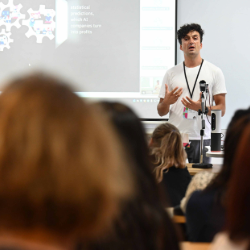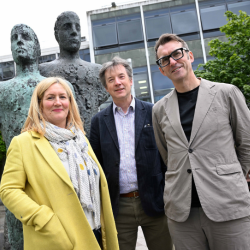-
Study
Study
Interested in studying at Northumbria? With 31,500 students, Northumbria is one of the largest universities in the country, offering courses on either a full-time, part-time or distance learning basis.
Discover more-
Undergraduate
- Undergraduate Study Degree
- Undergraduate Open Day & Events
- Application Guides
- Northumbria University UCAS Exhibitions
- Foundation Years
- Undergraduate Fees & Funding
- School & College Outreach
- Continuing Professional Development
-
Postgraduate
- Postgraduate Study Degree
- Postgraduate Research Degrees
- Postgraduate Open Days and Events
- Postgraduate Fees & Funding
- Flexible Learning
- Thinking about a Masters?
- Continuing Professional Development
- Change Direction
-
Student Life
- The Hub - Student Blog
- Accommodation
- Life in Newcastle
- Support for Students
- Careers
- Information for Parents
- Students' Union
- Northumbria Sport
-
-
International
International
Northumbria’s global footprint touches every continent across the world, through our global partnerships across 17 institutions in 10 countries, to our 277,000 strong alumni community and 150 recruitment partners – we prepare our students for the challenges of tomorrow. Discover more about how to join Northumbria’s global family or our partnerships.
Discover more-
Applying to Northumbria
- European Union
- Our London Campus
- Northumbria Pathway
- International Events
- Entry Requirements
- Agent Network
-
Northumbria Language Centre
- Faculty Requirements
- Acceptable English Requirements
- Pre-Sessional English and Study Skills
- Academic Language Skills Programmes (ALS)
-
International Fees, Funding & Scholarships
- International Undergraduate Fees
- International Undergraduate Funding
- International Masters Fees
- International Masters Funding
- International Postgraduate Research Fees
- International Postgraduate Research Funding
- International Money Matters
-
Life at Northumbria
- International student support
- The Hub - Student Blog
- Careers
-
International Mobility
- Current Northumbria Students
- Incoming Exchange Students
-
-
Business
Business
The world is changing faster than ever before. The future is there to be won by organisations who find ways to turn today's possibilities into tomorrows competitive edge. In a connected world, collaboration can be the key to success.
Discover more -
Research
Research
Northumbria is a research-rich, business-focused, professional university with a global reputation for academic quality. We conduct ground-breaking research that is responsive to the science & technology, health & well being, economic and social and arts & cultural needs for the communities
Discover more -
About Us
-
About Northumbria
- Our Strategy
- Our Staff
- Place and Partnerships
- Student Profiles
- Alumni Profiles
- Leadership & Governance
- Academic Departments
- University Services
- History of Northumbria
- Contact us
- Online Shop
-
-
Alumni
Alumni
Northumbria University is renowned for the calibre of its business-ready graduates. Our alumni network has over 237,000 graduates based in 178 countries worldwide in a range of sectors, our alumni are making a real impact on the world.
Discover more - Work For Us
What will I learn on this module?
This module offers 30-credits at level 7. It is part of a post-qualifying, Postgraduate Diploma, Community Specialist Practitioner Qualification (with pathways) (District Nursing, Community Children’s Nursing, General Practice Nursing or Adult Social Care Nursing). This module is available to full-time and part-time students undertaking the Specialist Practitioner Qualification (SPQ). This module is focused on leadership, specific to your area of clinical practice. It allows you to apply and relate what you learn in the classroom to your academic assessment by giving opportunity to explore an area of contemporary community specialist practice. During the module you will learn how to lead an audit in your area of specialist practice. Drawing on the findings of the audit, you will create a poster for presentation. The poster will outline a service improvement. As you complete the audit you will learn about the application of leadership theory, into practice. You will also gain knowledge about the development of sustainable practice-based interventions and the principles of risk stratification, that would improve health outcomes for your population. As Community Specialist Practitioners are required to demonstrate a proactive, autonomous approach to their practice, presenting the service improvement will enable you to develop knowledge, understanding and skills about directly influencing practice in a positive way within your discipline. Developing skills to recognise the need for action, entrepreneurship and innovation in public health practice, you will learn techniques to lead, influence and challenge stakeholders and services relating to health policies that affect your specialist area of practice.
At the end of the module the focus of your learning, through leadership, will be fundamental to the promotion of specialist practice within your pathway (District Nursing, Community Children’s Nursing, General Practice Nursing or Adult Social Care Nursing). This means opportunity to improve the health and well-being of individuals, families, communities, and populations, allowing you to demonstrate real-life application of your developing leadership skills. Each specific pathway encounters a range of real-world situations requiring leadership expertise, demonstration of sound judgement and skills to manage unpredictable circumstances. Specific to your field of practice in bespoke sessions, you will explore these in significant context in order to develop your knowledge and confidence which will be demonstrated in your pathway specific leadership role. You will also benefit from collaborative working with students from other pathways, allowing for integrated approaches to problem solving and managing complex decision making.
How will I learn on this module?
Northumbria University embeds Universal Design for Learning Principles (UDL’s) into their programmes to present content and information in different ways. This will help you to engage in learning. On this module, a number of different learning and teaching strategies are available based on the UDL principles. For example, Blackboard Ultra is the e-learning platform providing you with access to a range of module materials including e-lectures and learning resources. Blackboard Ultra as an e-learning platform enables flexible learning and opportunity to undertake directed and independent learning in your own time. It includes digital learning materials and resources for you such as electronic reading lists and electronic management of assessment through Turnitin. When used, Turnitin, (a web-based plagiarism software system) can help you to improve your academic writing and can be used both formatively and summatively as part of module assessment. This presents blended learning opportunities. You will be able to access online supported learning as e-lectures and learning resources as structured independent study, in advance of attending classroom sessions. In seminars and action learning sessions, you will have opportunity, and be encouraged to debate, and discuss contemporary specialist community public health practice specific to your discipline. In the classroom, you are able to focus on the most relevant, key learning areas in greater depth either by discussion, debate or peer review in seminars and action learning sessions. There is also authentic module assessment enabling you to integrate the theories of leadership, service improvement and business acumen, learned in the classroom, into the clinical area when you lead and develop your audit, as part of your assessment.
You will learn alongside other students giving opportunity for interprofessional learning. Peer support is encouraged and facilitated via action learning activities where together, an interactive and engaging learning environment is facilitated by academic staff. This learning can be personalised against your individual progress and is discipline specific in either District Nursing, Community Children’s Nursing, General Practice Nursing or Adult Social Care Nursing.
How will I be supported academically on this module?
The module tutor will introduce the module, including the module learning outcomes and authentic assessment strategy early in week one of the module, so you are aware of module structure, content, and assessment. Authentic assessment is one of the high impact areas in Northumbria Universities UDL principles. During action learning activities you will be able to undertake self-assessment in relation to your own learning and development using a personalised learning plan associated with authentic assessment planning. Specific seminars and action learning sets will support you to apply practice context to your learning, applying knowledge to the advancement and leadership as a Community Specialist Practitioner (District Nursing, Community Children’s Nursing, General Practice Nursing or Adult Social Care Nursing). Action learning sets are led by academics, to help you with the application of practice related learning within the discipline.
There are also a range of central Student Support and Wellbeing Services “Student Central” https://www.northumbria.ac.uk/about-us/better-northumbria/estates-development/student-central/ operating from Northumbria university libraries. This is available to support you around university academic processes for example, registering a change of circumstances, counselling and mental health support or disability and dyslexia support. The student support and wellbeing service at Northumbria (Ask4Help) https://www.northumbria.ac.uk/about-us/university-services/student-library-and-academic-services/student-engagement/ask4help/ is an excellent point of contact, which is located at Coach Lane and City Campus Libraries. Your programme lead or module tutor can discuss options with you. There are also a range of skills Plus activities and resources that are available with a research focus within the libraries. The link can be found here: https://library.northumbria.ac.uk/skillsplus. Libraries are open outside of formal scheduled teaching hours and there are student hub areas with access to technology available on both University campuses. Your clinical practice areas may also have active library facilities that you can access.
What will I be expected to read on this module?
All modules at Northumbria include a range of reading materials that students are expected to engage with. The reading list for this module can be found at: http://readinglists.northumbria.ac.uk
(Reading List service online guide for academic staff this containing contact details for the Reading List team – http://library.northumbria.ac.uk/readinglists)
What will I be expected to achieve?
Students will be able to:
Knowledge & Understanding:
Synthesise and apply the theory of leadership to advance practice for service improvement and innovation.
Undertake an audit, contextualised within local and national policy to evaluate and inform practice, understand implications and develop recommendations.
Intellectual / Professional skills & abilities:
Critically appraise new information and knowledge related to the audit and disseminate this using effective communication strategies.
Critically evaluate and demonstrate professional knowledge and skills of leadership for the advancement of local service improvement.
Personal Values Attributes (Global / Cultural awareness, Ethics, Curiosity) (PVA):
Demonstrate links between theory and practice of leadership, working in partnership with others to benefit local populations
How will I be assessed?
Both formative and summative assessment are included in this module.
Formative assessment includes:
During action learning, students can undertake self-assessment of their development and engage in peer support. You will present an assignment plan and receive feedback from the programme team and your peer group.
You can also use Turnitin (a web-based plagiarism software system) accessed via Blackboard Ultra to gain formative feedback on the written component of the poster. (MLO’s 1,4,5).
Summative assessment includes:
Part 1: Following an audit of clinical practice in Community Specialist Practice (with pathways) you will develop an academic poster. The poster will be focused on a suitable service improvement. The service improvement should reflect your audit, address areas for improvement and be contextualised in policy (1000 words). (MLO’s 1-5)
The poster will submitted electronically via Blackboard and the e-learning platform Turnitin. Oral feedback on the poster will be provided via Blackboard Ultra e-learning platform as a voice note.
Part 2: In a 20-minute oral presentation of your poster to peers and academic tutors you will articulate a rationale for your service improvement, outline key module concepts to demonstrate advancement of Community Specialist Practice (with pathways). A 5-minute question and answer session is included. (MLO’s1-5).
Feedback on the presentation will be provided via Blackboard Ultra e-learning platform as a voice note.
Pre-requisite(s)
n/a
Co-requisite(s)
n/a
Module abstract
This full-time and part-time module, Advancing Community Specialist Practice Through Leadership, offers 30-credits at level 7. It is suitable for post-registration nurses and is part of a Postgraduate Diploma (with pathways) (District Nursing, Community Children’s Nursing, General Practice Nursing or Adult Social Care Nursing). It offers a supported learning environment with clear focus on developing evidence-based knowledge and skills, of audit, service improvement and leadership as professional attributes required to meet the NMC Standards of Proficiency for Community Nursing Specialist Practice Qualifications (NMC 2022). Completing this module, will provide you with the opportunity to explore leadership knowledge and skills from both theoretical and clinical practice perspectives, and apply these to your area of specialist practice (District Nursing, Community Children’s Nursing, General Practice Nursing or Adult Social Care Nursing). Therefore, the module, uses and applies authentic assessment processes, presenting opportunities for you as a learner to lead change in an area of specialist practice.
Course info
Credits 30
Level of Study Postgraduate
Mode of Study 1 year Full Time
1 other options available
Location Coach Lane Campus, Northumbria University
City Newcastle
Start September 2024
All information is accurate at the time of sharing.
Full time Courses are primarily delivered via on-campus face to face learning but could include elements of online learning. Most courses run as planned and as promoted on our website and via our marketing materials, but if there are any substantial changes (as determined by the Competition and Markets Authority) to a course or there is the potential that course may be withdrawn, we will notify all affected applicants as soon as possible with advice and guidance regarding their options. It is also important to be aware that optional modules listed on course pages may be subject to change depending on uptake numbers each year.
Contact time is subject to increase or decrease in line with possible restrictions imposed by the government or the University in the interest of maintaining the health and safety and wellbeing of students, staff, and visitors if this is deemed necessary in future.
Useful Links
Find out about our distinctive approach at
www.northumbria.ac.uk/exp
Admissions Terms and Conditions
northumbria.ac.uk/terms
Fees and Funding
northumbria.ac.uk/fees
Admissions Policy
northumbria.ac.uk/adpolicy
Admissions Complaints Policy
northumbria.ac.uk/complaints












.png?h=162&w=275&modified=20240508204039&hash=E7730891F70B0846DBED986B881F8605)

